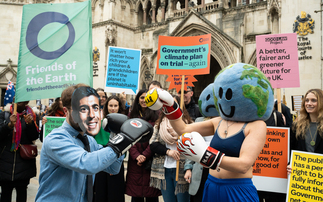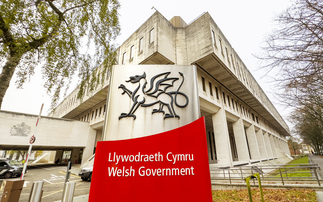From legal compliance to skills concerns, Brexit delivers challenges and opportunities for green businesses
Brexit means Brexit, as our tautological Prime Minister is wont to say. It also means 'having our cake and eating it' if poorly concealed government briefing notes are to be believed. Although anyone pinning too much hope on patisserie-based negotiating strategies should recall European Council President Donald Tusk's pointed observation earlier this summer: "Buy a cake, eat it, and see if it is still there on the plate".
But what does Brexit mean to the many environmental businesses operating in the UK - well over 100,000 at the last count - who are all influenced to a greater or lesser extent by EU policies, directives, targets, and investment?
That was the question that was wrestled with by a host of experts at the Environmental Industries Commission's (EIC) annual conference in London last week. It is also question that is particularly apposite given we are now just four months away from Article 50 being triggered and what little indication has come from government suggests a Hard Brexit is on the way. Meanwhile, there has been negligible public debate on how leaving the EU will impact the country's environmental performance, beyond private reassurances from some Ministers that the UK's Climate Change Act will guarantee continued decarbonisation efforts and reminders from opposition parties that no one who voted for Brexit voted for dirty air and water. The net result is the post-Brexit outlook for clean tech and green businesses is as opaque as the folders government aides are meant to keep briefing notes in on their way out of Downing Street.
The Brexit process is so complex and all-encompassing that it is hard to keep track of all the risks and opportunities businesses now face as a result, but the areas of focus for green firms seem to split into four broad cohorts: the risk of regulatory change and disruption, concerns over enforcement of regulations and the capacity of government to cope with Brexit, the impact on the economy and wider investment climate, and the impact on international trade and skills.
These fears will be familiar to any and all businesses operating in the UK, but they are particularly acute for those operating in the environmental space as they are subject to so many environmental policies that originate in Brussels. As Joanna Ketteley, head of environment at law firm Bird + Bird, observed, there are over 800 European environmental laws, spawning numerous rules and targets. But she added that despite this hugely important and influential body of legislation "we are still waiting for a clear statement from the government on environmental protection".
The government has attempted to provide a degree of certainty about the future of these regulations with its plans for a Great Repeal Bill that will transcribe all existing EU law into UK law. And late last month Labour's Shadow Brexit Minister Sir Keir Starmer attempted to crank up pressure on the government to provide additional assurances on the future of environmental regulations, telling Labour's environment campaign SERA the party "will fight for a Brexit deal that puts the economy, jobs and living standards first and makes sure there is no watering down of key environmental protections or standards".
"We will call for all existing EU environmental laws to be put into primary legislation through a new Act of Parliament," he added. "This would make it far harder for future governments to weaken environmental legislation. And it would enshrine EU minimum standards in UK law. But protecting what we have already gained from the EU should not be the summit of our ambitions. We should make the case for more progressive, more ambitious domestic environmental policy too. Not to match EU standards but to go beyond them."
But at the same time Starmer acknowledged that a hard Brexit "removed from the single market and outside of common regulations and minimum standards, could be hugely damaging for our environment, our climate and our wider politics and society". Meanwhile, it is increasingly clear the Great Repeal Bill is a starting point; once EU rules are embedded as UK legislation they will then be free to be repealed or modified by the government of the day.
The Great Status Quo Bill?
Former Conservative MP and CEO of Challenging Ideas, Laura Sandys, suspects the Great Repeal Bill will become a "Great Status Quo Bill" as parliament recognises that the vast majority of EU regulations are in the national interest. But she also predicts the process will lead to an audit of every EU rule and there is a risk valuable regulations could be "wiped out" if they are not defended. Businesses must be 'granular' about how policies and regulations work, she added, and 'shout louder' in defence of effective green policies.
Dustin Benton of think tank Green Alliance is similarly optimistic that many EU environmental policies can be defended or even strengthened. "Focus groups show some of those who wanted to leave did so because they want better environmental protection," he said. "And the government's previous red tape challenge has done very little because when they are looked at closely ministers see most of these rules are good policies."
He said environmental NGOs would follow up their recent calls to use Brexit to reform the Common Agricultural Policy with a similar push to deliver strong UK action on climate change, the low carbon energy transition, and environmental product standards.
Benton argued calls for effective environmental standards post-Brexit would be aided by the complex trade negotiations the UK will have to go through. "There is no rationale for trying to go it alone," he said. "In areas like REACH and eco-design UK manufacturers will still have to comply to access EU market, so if the UK seeks to remove standards British manufacturers would simply be undercut by crap imports that don't meet the EU standards. There is no mandate to do anything other than high standards."
Matthew Farrow, executive director of the EIC, makes a similar point, arguing a swift confirmation that the UK is willing to honour EU environmental standards could help get the already fractious negotiations underway on a good footing. As he notes, the simple reality is that EU states will not want to trade with a neighbour who can undercut them on environmental standards, at least not without demanding a hefty price in return.
This optimistic outlook is entirely rational, but as all of the experts on EIC's panel acknowledged, it does not fully account for the political pressures the government will be under.
"Brexit will take a long time and as a result there will be pressure for tokenistic victories for the leave camp," predicted Sandys. "They will be calling for the repeal of 'Green Crap'. Business needs to be ready to defend effective environmental policies."
It is a prediction that is echoed by Benton, who reckons some totemic battles over issues such as incandescent light bulbs and the power rating of hairdryers could be in the offing. He predicts a scenario where campaigners and businesses are "smeared" for wanting to deliver better products that save people money. It could prove easy for the government to hand some token victories to Brexiteers and their cheerleaders in the press, safe in the knowledge that any business wishing to trade with Europe will still have to meet EU standards and that global technological change is unlikely to be hampered too badly by the UK relaxing some energy use rules. But Benton and others fear token measures to 'cut the green crap' could quickly add up, leading to higher UK emissions and a chilling of green investor confidence.
Fear of zombies
Similarly, EIC's Farrow highlights his members' fear of so-called "zombie regulations" where EU rules and directives are retained, but the UK no longer has access to the EU funding and enforcement agencies required to ensure businesses take them seriously. Similarly, as EU targets for recycling, vehicle emissions, and air quality are met, will the UK government replace and extend them?
It is a legitimate concern. As Benton notes, air quality was only taken seriously at a government level when the risk of Brussels fines emerged and Ministers lost a legal battle over whether or not it was compliant with EU rules. "Enforcement will be the biggest challenge," he predicted. "Air pollution was only taken sreriously when threat of fines materialised and we won't have that backstop anymore."
He added that governments can enforce environmental rules, but "it doesn't come cheap". By way of an example he highlights how the Californian Air Resources Board has a $400m budget and the US EPA spends $600m on air quality issues. In contrast, the UK Environment Agency spends $400m on tackling all forms of pollution. "The VW scandal shows what you can do with well-funded, adversarial approach to enforcement," Benton argued. "But the funding has to there."










